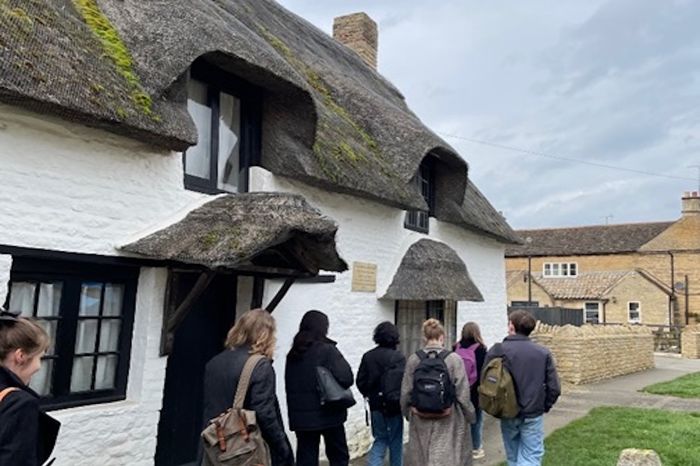Retracing steps: why we’re drawn to the literary town
While visiting Shakespeare’s birthplace, Emily Cushion questions whether the literary town truly has a place in modern life

Walking down the streets of picturesque Stratford-Upon-Avon, one hardly passes a single building that doesn’t claim to have ties with the town’s most famous resident: William Shakespeare. My family wasn’t alone in designing a holiday that revolved entirely around this singular writer – the place was packed with other tourists flocking to stand where the Bard had stood over 400 years ago. While Cambridge attracts far more than just fans of its many famous writers, the two towns felt to me inherently connected by a certain literary pull.
“We seemed to be engaging in a fruitless competition of intellectual superiority”
Stratford primarily capitalises on its ability to attract Shakespeare fanatics. One fast-food place asks customers to ‘Build your burger, “As You Like It!”’: a futile and tenuous connection to a Shakespeare play. The main locations relating to the Bard are his birthplace, New Place, and Anne Hathaway’s cottage. My family and I paid to visit all three – as an English student, I was particularly eager to extend my knowledge of Shakespeare (this time for enjoyment, rather than Easter Term coursework). The New Place turned out to be an especially sneaky tourist trap – the actual property lived in by Shakespeare was demolished in 1702. More than that, at the end of each visit, we couldn’t escape the vast selection of Shakespeare memorabilia – tea towels, postcards and gin bottles with the writer’s face printed on (I must admit this was one trap I couldn’t help falling into). I was reminded of Cambridge, and the countless shops imploring tourists to buy trinkets or apparel related to its university and colleges. The towns together seem to be frothing at the mouth for a tenner from the tourist, and are certainly successful in this enterprise.
My scepticism about the intent behind this literary fascination was reaffirmed when my dad and I found ourselves caught in a performance of intelligence, pointlessly reeling off facts to each other about Shakespeare and English history more generally. I noticed this phenomenon extended to many fellow tourists; we all seemed to be engaging in a fruitless competition of intellectual and cultural superiority, though we were all supposedly paying to learn more. This brought me back to a literary tour conducted by one of my supervisors, in which I felt determined to prove my pre-existing knowledge of Cambridge’s writers – looking back, it doesn’t seem that impressive to know that Byron kept a bear in his Trinity dorm room.
“The constancy we feel in a place bound up in history provides reassurance”
Though my view of the literary town became somewhat clouded by these superficial intentions, I still found myself romanticising my visit to such a beautiful, historically rich town. I thought of how I came to study English at Cambridge in the first place: a fundamental and insatiable desire to learn more about literature, birthed from a genuine love for it. These towns aren’t just landmarks of cultural commercialisation; they permit a form of escapism that is so rarely achieved. For me, this escapism lies in the way that the literary towns seem to be frozen in time. Charities like the Shakespeare Birthplace Trust dedicate themselves to the preservation of historical sites, resulting in a genuinely immersive experience that almost makes you feel like you’re being transported to the past. Our visit to Stratford allowed us to retrace Shakespeare’s steps – despite my reservations, I was elated to be exploring the hometown of the man whose writing I’ve been studying since primary school.
Last year, I attended a Blackbirds open mic at Newnham, and felt equally transported in time when given the opportunity to perform my own poetry there. It was the same college that Sylvia Plath, a favourite poet of mine, had attended around 70 years prior. While I’m not sure that all tourists of these towns are such avid fans of the authors they’re learning about, it doesn’t seem fair to say that all literary tourism is superficial. Over my time in Cambridge, the town has become irrevocably important to me, something undeniably linked to its ties with authors whose work I love, like Byron, Nabokov and Plath. I’m sure that Stratford has the same effect on the typical bardolator. Maybe it’s pretentious to say, but the attraction we feel to these towns is indicative of a historical and cultural richness that seems increasingly difficult to reach. In a time clouded by the incessant desire to change and progress, the constancy we feel in a place bound up in its own history provides reassurance, and keeps us returning to the literary town.
 News / Candidates clash over Chancellorship25 April 2025
News / Candidates clash over Chancellorship25 April 2025 Interviews / Dr Ally Louks on going viral for all the wrong reasons25 April 2025
Interviews / Dr Ally Louks on going viral for all the wrong reasons25 April 2025 Music / The pipes are calling: the life of a Cambridge Organ Scholar25 April 2025
Music / The pipes are calling: the life of a Cambridge Organ Scholar25 April 2025 News / Cambridge professor paid over $1 million for FBI intel since 199125 April 2025
News / Cambridge professor paid over $1 million for FBI intel since 199125 April 2025 Arts / Plays and playing truant: Stephen Fry’s Cambridge25 April 2025
Arts / Plays and playing truant: Stephen Fry’s Cambridge25 April 2025






